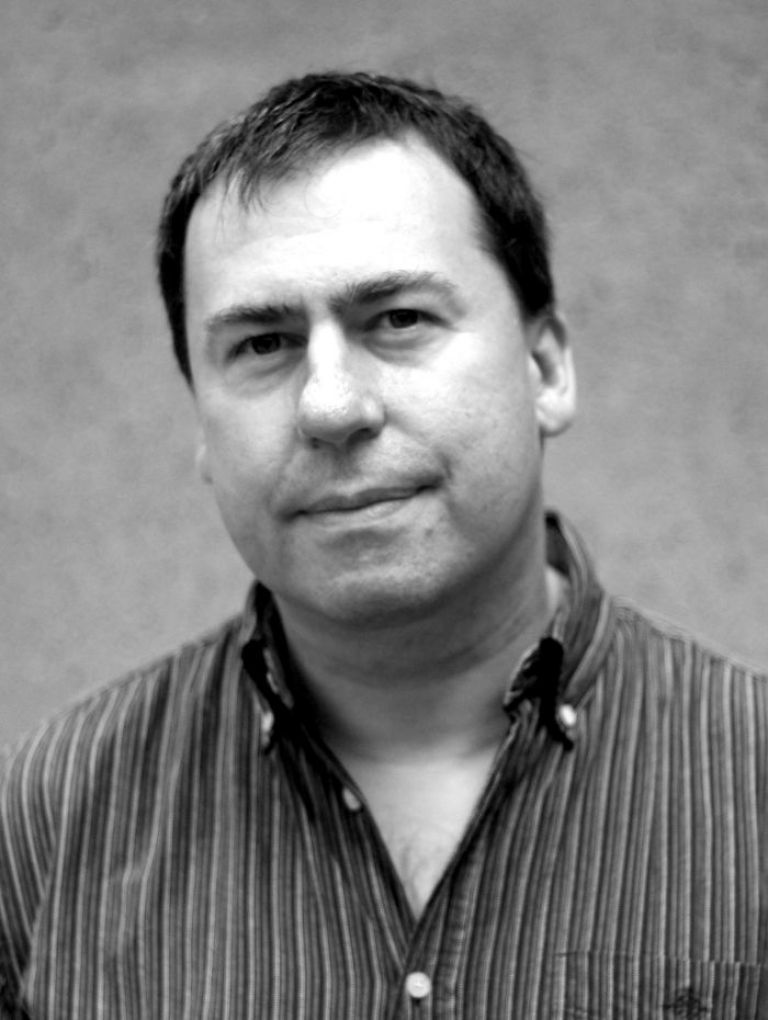Audiovisual Authors Online - Paul Powell Keynote

Paul Powell's keynote speech at SAA's conference - Audiovisual Authors Online - Seizing the Digital Revolution.
Good afternoon, it’s an honour to be here and to be given this opportunity to address the conference, in front of so many distinguished guests, including members of the European Commission, the European Parliament and collective management organisations.
And to be sharing the stage with so many accomplished authors. It’s a privilege to be in your presence.
Most of all, I’d like to thank the Society of Audiovisual Authors, the Societe des Auteurs Audiovisuels for inviting me.
Proud to be associated with an organisation that represents over 120,000 European directors and screenwriters.
And it’s at this point, that I really wish I’d spent longer writing my speech….
I’m here to briefly talk about the role of authors and their place in the value chain.
WHO I AM & WHAT DO I DO?
I am a comedy writer working in British television and radio, with over 20 years of professional experience.
I am entirely freelance and live the usual writer’s life of staring at my 2012 diary and panicking that it will never be filled.
Over the years, I’ve written for some of the biggest shows in British television, and worked alongside some of the biggest names.
Everyone from comedians like Griff Rhys Jones and Miranda Hart through to Hollywood stars like Whoopi Goldberg and Will Smith. Sadly, it wasn’t writing a Hollywood movie…
In the past three years, I’ve established my own production company – Black Dog Television – with two friends and colleagues. Partly, to take more control over our careers, and partly to explore new challenges.
We’ve just finished making a series for British TV and we’re shooting a pilot for the BBC at the start of 2012.
I am – in effect – a jobbing writer. A writer for hire. And I work on all sorts of different shows –
- Comedy quiz shows
- Sketch shows
- Situation comedy – sitcom
- Entertainment shows – inc hour long special with Barry Manilow.
- Awards ceremonies – writing the script for the host and usually the citations
- One line jokes
Also lots of script editing – take a script and give it some spark and some sharpness. Giving it more clarity, making it less verbose, ideally, more fun.
Sometimes, I create an idea from scratch, sometimes I am given someone else’s idea and asked to realise it.
And since I began, I’ve been developing my own shows. Dreaming up new formats, new situations, and pitching those to decision makers.
HOW DO I GET PAID?
Different payment systems –
Daily rate – a flat fee for working 8 hour day – usually 10 – 6pm (comedy writers and mornings don’t mix too well). This fee is usually a buy out, granting the producer all further rights to the use of the material. As a result the initial payment is rather generous.
Typical for quiz shows, entertainment shows, topical programmes.
Commission – a fee for producing a specific amount of material – usually calculated in minutes. Less well paid but it does generate repeat fees and royalties.
Typical for sketch shows.
Agreed Fee – again, a fee for producing a specific amount of material, usually an entire script. Again, less well paid but with the right to repeat fees and royalties.
Typical for situation comedies.
I work with a number of different companies but my key working relationship is with my agent. Casarotto Ramsay have been representing me for 11 years now and the relationship is exceptionally good.
My agent, Abby Singer, doesn’t necessarily find me work. In fact, most of my work comes from contacts in the business, previous employees, or by word of mouth. However she does handle all my contracts and negotiates my time, my fees and the division of rights.
On top of that I have a 15 year relationship with the British collective management organisation – the ALCS, who do a great job of tracking down remuneration and promoting author rights.
They even persuade me to visit Brussels to speak to important people. Yes, that’s you.
So I have an enthusiastic support network, championing my rights and protecting my interests. I literally could not do it without them and their work is crucial.
HOW DO WRITERS FIT INTO THE VALUE CHAIN?
I think British writers are lucky in having very clearly defined hierarchy and commissioning system.
Inevitably, a writer is hired by a producer. By which I mean, the person responsible for the day-to-day running of a show.
The producer is your sole point of contact – they will brief you, liaise with you, review your work. If you’re lucky, they’ll bring you coffee and provide you with a computer that is less than 20 years old and doesn’t run on steam.
The producer is freelance and hired by the production company. Obviously these come in all shapes and sizes. Some companies will be pan-European, even pan-global, some will be ran by two blokes above a pizza restaurant.
The production company is hired by a broadcaster. In the UK we have five terrestrial broadcasters and around a dozen digital broadcasters. Each broadcaster will have specialist teams – whether it’s Drama, Lifestyle, Comedy or Entertainment – and there’ll be a commissioner within that department responsible for searching out new shows, briefing production companies, and fostering relationships with talent.
They’ll agree a budget and delivery schedule with the production company – which inevitably the production company will think is too low and the broadcaster will think is too high. And which the writer will think doesn’t pay enough attention to the writer.
Throughout the production process, the commissioner will be working alongside the production company, giving notes and guidance.
So that’s the typical hierarchy. Broadcaster – Commissioner – Production Company – Producer – and Writer. At the bottom. But propping up all the others!
Because without that initial idea, no one makes anything.
And yes, I am over emphasising my importance….
But of course, one of the reasons we set up Black Dog was to bypass some of those levels, get closer to the top of the tree, and cut out some of the middle men.
MYTHS & MISUNDERSTANDINGS
There are a great deal of myths and misunderstandings about writers and what we do.
For a start, writing is a job. It’s something I do Monday – Friday, eight or nine hours a day, frequently at evenings and weekends. People seem to think writers do nothing except sit around, drinking coffee, and daydreaming. Admittedly, I do that 90% of the time.
Writers may not sweat, but we work hard. Usually against tight deadlines and big pressures. The greatest pressure of all being the blank page and the ticking clock.
Writers are not naïve. We are practical people and we are aware we are in a business. We enjoy our work but we are aware it’s about commercial opportunities with a ground base of money.
We keep an eye on markets, audiences, social trends, and tastes. We look to exploit gaps in the market, and to meet audience demands.
In many respects, we are entrepreneurs, plucking fresh, original ideas from thin air, and developing them into something marketable.
THE IMPORTANCE OF COPYRIGHT
Fair to say at various points in my career, I have relied heavily on repeats and royalties.
Right from the very start, when I worked in radio, I depended on overseas broadcasts on the BBC World Service, to pay my rent and food bill.
And I still rely on royalties. It’s a significant percentage of my income.
But increasingly, my copyright is under threat.
I just want to give you an example. Earlier this year, my production company – Black Dog - made a pilot programme for the digital broadcaster UKTV. The show was broadcast at 10pm on a Bank Holiday Monday evening on a channel called Dave. (Very British name for a TV channel – Dave).
We had an audience of around 200,000 viewers. In UK terms, that’s small.
But the very next morning, I decided I’d see what people were saying about our show. So I googled the title of the show – Alexander Armstrong’s Big Ask. The results were amazing. The first page of results were all for bit-torrent sites, offering a free download of my show. It was shameless theft. I can’t imagine what the results would be for one of our major drama shows.
What’s more, with advertising down, and more broadcasters competing for audiences, television budgets have been severely reduced. Recently, Black Dog were in negotiations to make a sitcom based around a magical fantasy world. More specifically, a pub. To get that show made, we had to negotiate an advance with a DVD distribution company, to release extra finance, just to get enough money to make the show.
So we rely on DVD sales to make our programmes.
And if people are getting these shows for free on the internet to watch whenever they like, who’s going to spend £10, £20, on a DVD?
It is a very disturbing trend.
WHAT ARE THE ISSUES FACING US?
First of all, the UK is currently undergoing a digital switchover from analogue to digital broadcasting – give more prominence to digital broadcasters. Instead of 5 channels, audiences will have a minimum of 50. Satellite and cable viewers have up to 300.
That is stiff competition and it’s going to cut advertising and cut budgets.
It’s also causing competition on the various platforms. Huge amounts of money being spent for a prominent position on the EPG. To grab attention, broadcasters are spending more money on branding and advertising.
We are seeing huge growth in the VOD market. Driven by technology like the BBC iPlayer which lets you view almost any BBC show broadcast over the past seven days for free.
And time shifted viewing is having a massive effect on ratings. Shows like the science fiction series ‘Doctor Who’ now attract 20% of their viewers through VOD and recordings. Overnight ratings are becoming worthless – with consolidated figures becoming dominant.
Technology like the iPod and the iPad is driving the growth of downloads. Apple’s iTunes has become the number one destination for buying and renting content.
And of course there’s a push to keep one step ahead of piracy, introducing new technology and experiences. The most prominent being 3D in television and film.
WHERE DOES THAT LEAVE US?
So we’re going through a period of change. But it’s not something to fear – it’s something to be excited about.
People are watching television and film in a whole new context. They’re watching more of it.
There are one million people directly working in the European audiovisual industry.
In 2009 they produced ¢108 billion of gross revenues.
In 2010 EU feature film production reached a record high of 1,203 feature films
We may not have wealth but we have a wealth of opportunities.
I love the fact I can watch my favourite TV show on an iPad on a train to Brussels. (I wasn’t – I was working)
I love the fact programme makers can access audiences like never before, cater to specific tastes and markets.
I love the fact smaller production companies like Black Dog are being given the opportunity to make programmes.
I love the fact new writers aren’t just sending me scripts, they’re filming them and sending me DVDs and downloads.
It’s an exciting time. But as the audiovisual industry grows, it needs to be managed and protected.
We need transparency, we need communication, we need copyright, fair remuneration, and anti-piracy legislation, and we need to keep an eye on the past as we walk towards the future.
Thank you.

